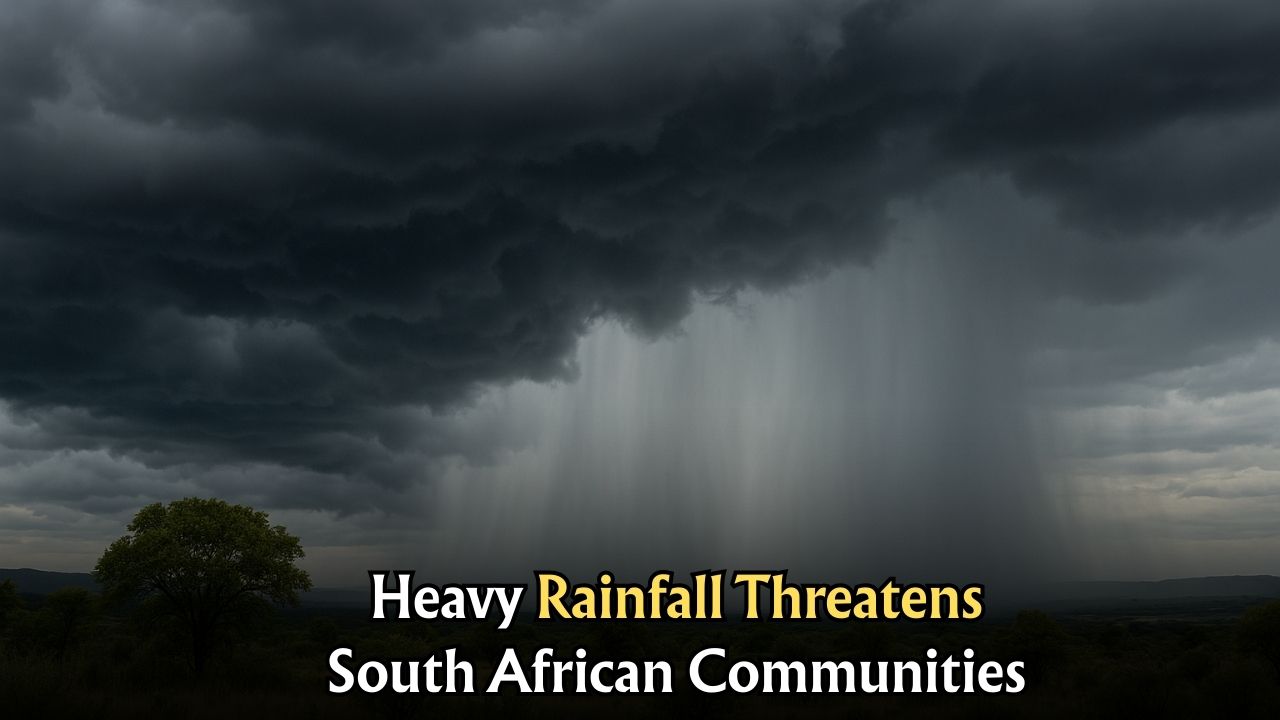South Africa Weather Alert – South Africa is bracing for a heavy rainstorm this week, with weather experts warning of possible flooding, road disruptions, and delays in key areas. According to the South African Weather Service, a strong system is moving across several provinces, bringing intense rainfall, thunderstorms, and strong winds. Residents in low-lying regions are advised to take precautionary measures, as heavy downpours may result in flash floods and localized damage to infrastructure. Emergency services have already issued alerts, urging people to avoid unnecessary travel and secure their homes against possible leaks or flooding. Farmers are also advised to prepare for potential crop and livestock damage, as excessive rainfall can create challenges for rural communities. With the weather patterns intensifying, South Africans are urged to stay informed by checking local forecasts regularly. While the rain may bring much-needed relief to drought-affected areas, it also carries risks that could impact daily life, transport, and power supply across different regions.
Impact of Heavy Rain on Daily Life
The heavy rainstorm expected this week is likely to affect day-to-day life across many parts of South Africa. Urban areas may face waterlogging, traffic disruptions, and delays in public transport, especially in major cities like Johannesburg, Pretoria, and Durban. Motorists are being urged to drive cautiously, as slippery roads and reduced visibility could lead to accidents. Electricity supply interruptions are also possible, particularly in regions where strong winds accompany the rain. For school-going children and working professionals, the adverse weather may cause schedule delays and temporary closures of some facilities. Local businesses, especially those relying on transport and outdoor operations, could also face setbacks during this period. While the rainfall is a natural part of seasonal change, the sudden intensity of the storm makes it crucial for residents to prepare ahead of time. Keeping essential supplies, such as flashlights, batteries, and non-perishable food, is recommended to manage any temporary disruption.
Precautions Recommended by Authorities
Authorities have urged South Africans to prioritize safety as the heavy rainstorm approaches. The South African Weather Service has advised people living near rivers and dams to remain alert for rising water levels. Those in flood-prone areas are encouraged to relocate temporarily or keep emergency contact numbers handy. Municipalities are preparing disaster management teams to respond quickly in case of emergencies, ensuring that residents receive timely support. Homeowners are advised to check drainage systems, clear clogged gutters, and secure outdoor items to prevent damage from strong winds. Travelers are cautioned against crossing flooded roads, as fast-moving water can be life-threatening. Parents are also urged to monitor their children closely and avoid letting them play near open water during the storm. By following these precautionary measures, communities can reduce risks and ensure the safety of their families. The government has assured citizens that updates will be provided regularly through media and weather apps.
Possible Effects on Agriculture
The upcoming rainstorm could bring mixed consequences for South Africa’s agricultural sector. On one hand, consistent rainfall is beneficial for replenishing water reserves and supporting crop growth in drought-hit areas. However, excessive rainfall in a short period can damage crops, especially maize, sugarcane, and fruits, which are vulnerable to waterlogging. Farmers may face challenges in harvesting and transporting produce if rural roads become inaccessible due to flooding. Livestock farmers are also on alert, as heavy rains increase the risk of diseases linked to wet and muddy conditions. Agricultural experts suggest that farmers take preventive steps, such as moving animals to higher ground and ensuring sufficient feed supplies. Although rain is vital for long-term agricultural sustainability, sudden downpours often bring more harm than benefit. Authorities are working with rural communities to minimize risks and ensure that farming activities can resume quickly once the storm passes.
Forecast and Duration of the Storm
According to meteorologists, the rainstorm is expected to intensify mid-week and may last for several days, affecting multiple provinces including Gauteng, KwaZulu-Natal, Eastern Cape, and parts of Limpopo. The heaviest rainfall is predicted during the night hours, which could increase the chances of flash floods and landslides in hilly areas. Temperatures are expected to drop slightly due to cloud cover and persistent rain, adding a chill to the weather. The storm is likely to weaken by the weekend, but isolated showers may continue in some areas. Residents are encouraged to stay tuned to weather reports and alerts issued by the South African Weather Service for real-time updates. With climate patterns becoming more unpredictable, experts stress the importance of preparedness and community cooperation. This week’s rainstorm serves as a reminder of the need for better infrastructure and disaster readiness in South Africa, as extreme weather events become increasingly frequent.
